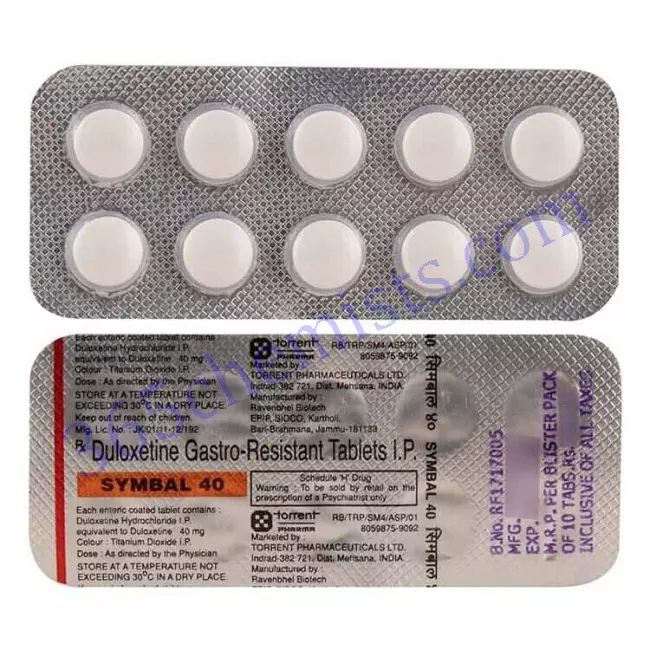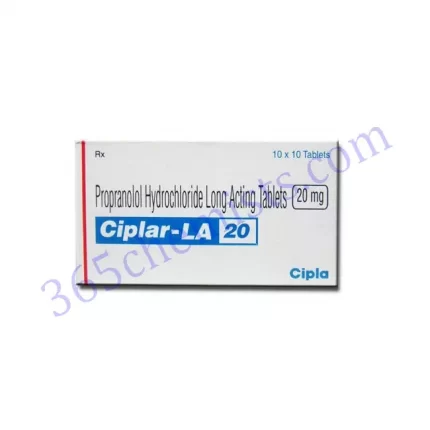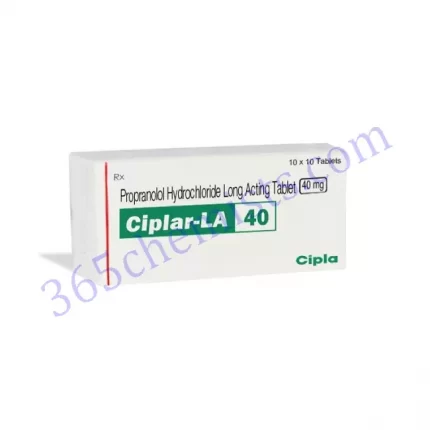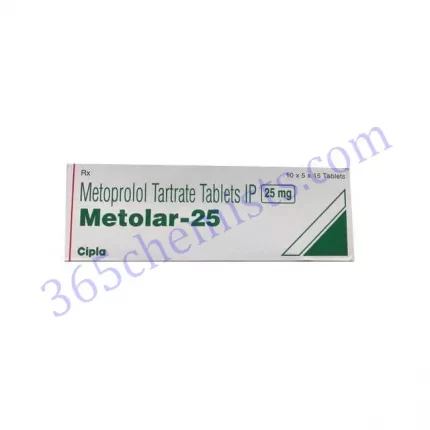Symbal 40mg Tablet: A Comprehensive Description of Duloxetine for Depression and Pain Management
The active component of the medication known as Symbal 40mg Tablet is duloxetine in a dosage of 40 mg per tablet. For the treatment of major depressive disorder, generalised anxiety disorder (GAD), diabetic peripheral neuropathic pain, and fibromyalgia, the serotonin-norepinephrine reuptake inhibitor (SNRI) duloxetine is recommended. The purpose of this in-depth analysis is to provide useful information regarding the composition, mechanism of action, indications, dosage, side effects, and precautions associated with Symbal 40mg Tablet.
Composition and Mechanism of Action:
A compound known as duloxetine, which can be found in Symbal 40mg Tablets, is known to inhibit the reuptake of both serotonin and norepinephrine in the brain. Duloxetine works to regulate mood and reduce pain signals by elevating levels of certain neurotransmitters, which it does by increasing their production. This dual mechanism of action is responsible for its efficacy in managing both depressive symptoms and certain types of chronic pain. These symptoms can be managed effectively by the medication.
Indications and Usage:
Major depressive disorder (MDD) is a mood disorder that is characterised by persistent feelings of sadness, loss of interest, and changes in appetite or sleep patterns. The primary indication for the use of Symbal 40mg Tablet is for the treatment of major depressive disorder (MDD). Generalised anxiety disorder, also known as GAD, is a condition that is characterised by excessive worrying and anxiety about various aspects of life. This medication is also prescribed for GAD.
In addition, the diabetic peripheral neuropathic pain that is associated with diabetes and experienced by people who have the condition can be effectively managed with the use of the Symbal 40mg Tablet. This form of nerve pain is brought on by the damage that diabetes causes to nerves. Additionally, it is utilised in the treatment of fibromyalgia, a persistent condition that is distinguished by widespread pain, exhaustion, and tenderness in particular regions of the body.
Dosage and Administration:
It is recommended that the dosage of Symbal 40mg Tablet be individualised for each patient based on their response to treatment, the severity of their symptoms, and the presence of any other medications being taken at the same time. It is extremely important to take the medication exactly as directed by the healthcare professional, both in terms of the dosage and the length of time.
The typical and recommended dose of Symbal 40mg Tablet for the treatment of major depressive disorder and generalised anxiety disorder is 40mg once daily. On the other hand, a higher dose, such as 60 mg per day, may be required in certain circumstances. The requirements of each individual patient will serve as the basis for the healthcare professional’s decision regarding the correct dosage.
The starting dose of 30 milligrammes per day is recommended for the treatment of diabetic peripheral neuropathic pain and fibromyalgia. If additional treatment is required, the daily dose can be increased to 60 milligrammes per day. The maximum dose that should be taken in one day is 120 mg.
Side Effects:
The active component in Symbal 40mg Tablet, duloxetine, has the potential to cause certain adverse effects; however, not everyone will experience these side effects. Nausea, dry mouth, constipation, dizziness, drowsiness, and sweating are common adverse reactions that can occur when taking this medication. In most cases, these adverse effects are mild and temporary; however, it is imperative to speak with a medical professional in the event that they continue or become worse.
In some people, taking duloxetine can lead to more serious adverse reactions. These reactions include serotonin syndrome, which is characterised by agitation, hallucinations, rapid heartbeat, fever, and muscle stiffness; hepatotoxicity, which is damage to the liver; hyponatremia, which is low sodium levels; and suicidal thoughts. If any of these potentially life-threatening side effects manifest themselves, immediate medical attention is required.
Precautions and Contraindications:
Before beginning treatment with Symbal 40mg Tablet, it is essential to disclose any pre-existing medical conditions to the healthcare professional. This is especially important in the case of impairment of the liver or kidneys, bipolar disorder, and a previous history of drug abuse. There is a possibility that the monoamine oxidase inhibitors (MAOIs), other antidepressants, and certain pain medications could have an adverse reaction when combined with the Symbal 40mg Tablet. As a result, it is imperative that any and all medications currently being taken be disclosed to the healthcare professional.
Patients who have previously demonstrated an extreme sensitivity to duloxetine or any of the other components of the formulation should not take the Symbal 40 mg Tablet. It should not be used at the same time as MAOIs, nor should it be used within 14 days of stopping treatment with MAOIs.
Conclusion:
It has been shown that the medication known as Symbal 40mg Tablet, which contains the active ingredient duloxetine 40mg, is useful in the treatment of major depressive disorder, generalised anxiety disorder, diabetic peripheral neuropathic pain, and fibromyalgia. It does this by raising levels of the neurotransmitters serotonin and norepinephrine in the brain, which in turn helps regulate mood and reduce pain signals. However, in order to use Symbal 40mg Tablet in a manner that is both safe and effective, it is absolutely necessary to strictly adhere to the dosage and precautions that have been prescribed. It is possible to improve therapeutic outcomes and reduce the risk of side effects by maintaining regular monitoring and maintaining open communication with healthcare professionals.












